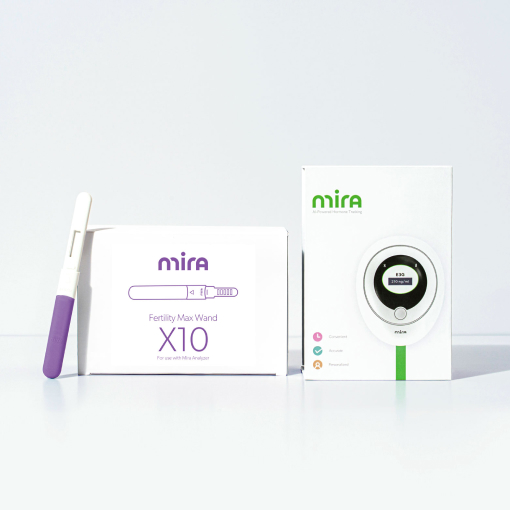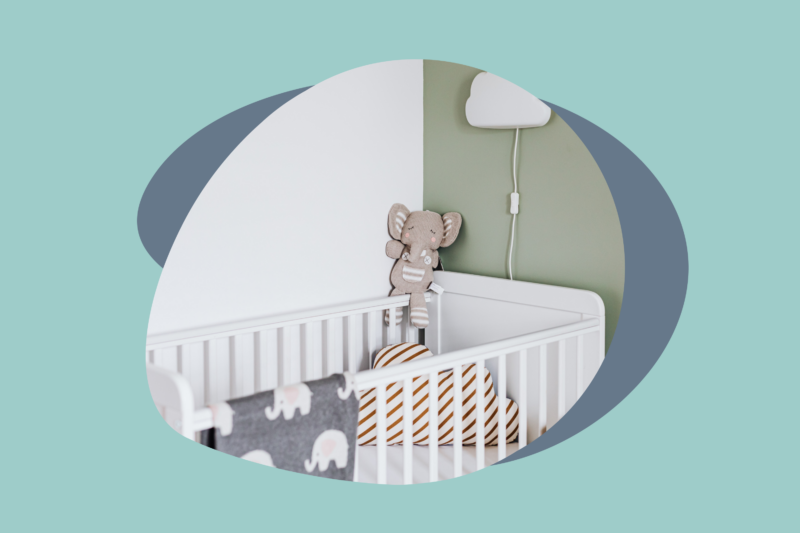Finding the Best Time to Have a Baby Based on Health, Age, and Lifestyle
As women, our peak fertile years are during our 20s, yet many of us aren’t ready to have a baby at that age. We may be more focused on our careers, on buying a house, on finding the right partner, or on traveling the world than on starting a family.

The “right time” to have a baby should, theoretically, balance our biology with our goals. But is there ever a perfect time to have a baby? The answer is yes, but the “perfect time” for having a baby is different for all of us. Here’s how to figure out when is YOUR best time to have a baby.
Is There a Best Time to Have a Baby?
If fertility were the only factor that went into having a baby, the answer would be clear: a woman’s peak fertile years are in her 20s. Female fertility steadily decreases throughout your 30s and 40s, dropping most significantly after age 35.
Yet age is not the only thing that matters when considering when to start a family. You also need to take into consideration your individual health, your financial status, your relationship status, and whether you are emotionally ready to become a mother, among other concerns.
As women continually weigh these concerns, the age of the average mother has become older. In 2016, birth rates for women 30 and under declined, while birth rates for mothers 30 and older rose. Thanks to modern medicine and fertility technology, it’s now possible to have a healthy pregnancy well into your early 40s.
Thus, it’s difficult to say whether there is really a “best time” to have a baby. Science would say that your best chances of conception occur before age 35 — but then again, the research does not take into consideration other sociocultural factors that are important to making this life-changing decision.
Factors Affecting When to Have a Baby
The right time to have a baby is different for everyone because no two women are exactly alike. Our health status, our age, our lifestyle, our careers, our goals… all of these factors and more affect when (or whether) we decide to try for a baby. Using the information below, you can weigh your individualized concerns to determine when the best time might be for you to have a baby.
Age
When talking about the right time to have a baby, most doctors bring up age as a primary concern. Your fertility peaks in your 20s and steadily declines as you grow older, with the most significant decline occurring after age 35. This decline happens due to the changes in egg quantity and quantity that happen as a woman ages. However, that does not mean that it is impossible or even dangerous to get pregnant in your 30s or early 40s. In 2016, most live births occurred to mothers between the ages of 25 and 34 — but pregnancy after age 35 is still possible, especially given the advent of assisted reproductive technologies like in-vitro fertilization (IVF) using donor eggs.
Because there are increased health risks for older mothers, it’s important to be aware of how age could affect your pregnancy and the health of your future baby. Most babies are born healthy, even to mothers in their 40s, but the risk of miscarriage, complications, and birth defects is greater after age 35. If you do decide to have a baby in your late 30s or early 40s, it’s important to make sure that the hospital where you give birth is equipped to handle any potential health risks.
Health
Maintaining a healthy body helps you maintain a healthy pregnancy. It may be better for you to have a baby sooner or later, depending upon your personalized health risks. For example, if you suffer from a health condition affecting fertility — such as polycystic ovarian syndrome (PCOS) or endometriosis — it may take longer for you to become pregnant, meaning you may want to start trying for a baby earlier in life. You should also keep in mind that in-vitro fertilization (IVF) is most successful in women in their 20s, so trying for a baby sooner leaves more time for you to consider this option if fertility issues arise.

Female Infertility
The most common reason for infertility in women is anovulation — or failing to ovulate during your menstrual cycle. If your ovaries do not release an egg, it cannot be fertilized, meaning you cannot get pregnant. This can be due to disease, such as endometriosis, PCOS, or primary ovarian insufficiency (POI), or due to problems with health and lifestyle. Many diseases affecting ovulation, such as endometriosis, PCOS, and POI, run in families, so you may want to ask your parents if you have a genetic history of these diseases in your family line so you can prepare yourself.
Weight
When it comes to health and lifestyle issues that are changeable, your weight, in particular, influences your ability to get pregnant. Underweight, overweight, and obesity can all make it more difficult for you to conceive. Fat tissue produces estrogen and having too much or too little can interfere with ovulation. Being overweight or obese can also reduce the odds that you will be able to conceive successfully using IVF. If you are underweight, overweight, or obese and thinking about getting pregnant soon, it may be better to wait until you are at a healthier weight to conceive.
Male Infertility
Your partner’s reproductive health also plays an important role in your ability to conceive. The most common causes of infertility in men are problems with the sperm or testicles. One problem, called varicocele, occurs when the veins on a man’s testicles are too large, causing the testicles to overheat. This excess heat affects the shape of the sperm. Misshapen sperm cannot move as effectively through the cervix, uterus, and fallopian tubes as normal sperm. Many of these problems can be detected early through a simple test at your doctor’s office. If your partner suspects he may have a fertility issue, encourage him not to wait and to schedule a visit ASAP.
Lifestyle
The lifestyle you lead now plays an important role in priming your body for a future pregnancy. Many people lead healthier lifestyles in their 30s and 40s than they did in their 20s. Even if you do not want to get pregnant for many years, you should consider making some small lifestyle changes to protect your reproductive health.
Psychological Stress
Stress can negatively impact our health in a variety of ways, so it should come as little surprise that it may decrease your fertility as well. Research shows that women with high levels of alpha-amylase, an enzyme secreted when we are stressed, are 29% less likely to get pregnant than women with normal or low levels of alpha-amylase. Male fertility may also be affected by stress, as it can interfere with sperm production. In severe cases, prolonged emotional stress may lead to depression, which has been proven to make a man less likely to conceive. This may be due in part to the negative effects of depression on sex drive. Thankfully, there’s evidence to show that managing stress with mindfulness may help with conception: in a study of women undergoing IVF, those who participated in a mindfulness-based intervention were significantly more likely to get pregnant than those who did not participate.
Substance Use
One of the most important changes you can make for your overall health and your fertility is to stop smoking or using illicit drugs. You should also minimize your use of alcohol (and quit cold turkey when you are trying to conceive). There are many dangerous health risks to using these substances, such as the risk of lung cancer or liver damage, which may impede your ability to get pregnant in the future. Furthermore, tobacco, drugs, and alcohol may all negatively impact your fertility — especially if you smoke cigarettes. Your partner should also watch their substance use, as alcohol, drugs, and tobacco can negatively impact testicular function as well.
Caffeine
If you’re a coffee-lover, you might also be wondering if your daily cup of joe plays a role in your fertility. The coffee itself won’t negatively impact your fertility, but the caffeine it contains might. There is mixed evidence when it comes to the effects of caffeine on conception. An old but widely quoted study said that women who drank more than one cup of caffeinated coffee per day were less likely to get pregnant than those who drank one or less. However, this study has since been called into question by at least nine newer studies. Still, if you are concerned about your caffeine intake, it probably won’t hurt to cut back on coffee — or switch to decaf.
Environmental Toxins
Man-made chemicals are everywhere these days. Unfortunately for your fertility, many are also endocrine-disruptors that can negatively impact your ability to get pregnant, now or in the future, by changing the function of hormones like estrogen. If you want to get pregnant someday, you should start avoiding these toxic chemicals ASAP. The most dangerous offenders are bisphenol A (BPA), found in certain plastics; phthalates, found in personal care products; and perfluoroalkyl (PFAS), found in cosmetics, animal products, and microwave popcorn bags. To protect your fertility, there are simple steps you can take: for example, you might switch to a BPA-free water bottle such as the glass BKR bottle, screen your personal care products and makeup using the Environmental Working Group’s Skin Deep database, try doing Meatless Mondays, or learn to make your own microwave popcorn, sans PFAS.
Medication Use
Medications can have varying effects on the fertility of both men and women. Women in particular are sensitive to the effects of many medications on ovulation. Both over-the-counter drugs like non-steroidal anti-inflammatory drugs (NSAIDs), including aspirin and ibuprofen, and prescription drugs like selective serotonin reuptake inhibitors (SSRIs) and antipsychotics, including fluoxetine (Prozac), escitalopram (Lexapro), and aripiprazole (Abilify), can interfere with your ability to ovulate regularly. Men who use prescription testosterone or opioids may also see negative effects on their fertility, and especially their sperm concentration. Furthermore, chemotherapy and radiation for cancer lead to permanent infertility in both men and women. People who have undergone cancer treatment may need the assistance of IVF to get pregnant.
It’s also worth noting the effects that birth control can have on fertility. If you are not thinking about getting pregnant right now, you will probably want to use some type of birth control method. However, some birth control methods, such as the oral contraceptive pill, can affect your fertility even after you stop taking them. It can take one to three months for ovulation to become regular again after stopping the pill — so, if you think you want to conceive soon, you may want to consider a birth control method that can quickly be reversed, such as an intrauterine device (IUD) like Mirena or an implant like Nexplanon. You should also always use a barrier method, such as a condom, to protect against sexually transmitted infections (STIs), and promptly treat symptoms of any STIs with antibiotics. Untreated STIs can lead to pelvic inflammatory disease, which may cause scarring of the pelvic organs that results in infertility.
Steps to Take Before You Get Pregnant
At any age, you should do everything you can to prepare your body for a healthy pregnancy before trying to conceive. Regardless of when you decide to get pregnant, here are some steps you can take to make conception as easy as possible.
Stop Birth Control
This one might seem obvious — but depending on your birth control method, you may need to plan ahead. Options like the IUD and the implant are reversible, meaning your fertility returns to normal as soon as the devices are removed. However, other methods, such as the contraceptive pill or the Depo-Provera shot, take a few months to wear off. While your fertility can return to normal fairly quickly after stopping the pill or shot, you should expect it to take one to three months before you begin to ovulate normally again.
Start Taking Supplements
As soon as you start trying to conceive, you should take a daily prenatal vitamin to ensure your body has all the nutrients it needs to support a healthy pregnancy. Your prenatal vitamins should contain, at minimum:
- 400 mcg of Folic Acid
- 27 mg of Iron
- 600 IU of Vitamin D
- 1,000 mg of Calcium
- 1.6 mg of Vitamin B6
- 70 mg of Vitamin C
- 9.5 mg of Zinc
- 800 mcg of Copper
Folic acid and iron are especially important to the development of a growing fetus. Folic acid protects against neural tube defects such as spina bifida, while iron prevents anemia in pregnancy.
Recommended for you
Navigate your fertility with peace of mind
Healthy Diet
You are what you eat — and if you want to be pregnant, you need to eat well. It’s important to eat a balanced, healthy diet rich in whole grains, fruits, vegetables, and lean protein. The “Fertility Diet” is one style of eating that’s compatible with overall health, while also boosting your ability to conceive: women who followed this diet were 66% less likely to suffer from ovulatory infertility and 27% less likely to suffer from infertility from other causes. The Fertility Diet is not a strict dietary plan so much as a list of loose guidelines. According to the diet, women who want to get pregnant should try to eat:
- Less trans fat and more monounsaturated fat
- Less animal protein and more vegetable protein
- More high-fiber, slow-digesting carbohydrates
- More vegetarian sources of iron and fewer meat sources
- High-fat dairy instead of low-fat dairy
Sleep
Sleep matters to your overall health and well-being, and especially for your fertility. For both men and women, having a sleep disorder (such as insomnia) increases the risk of infertility. Some of the strongest evidence comes from research done in men. One study found that men who sleep too little (defined as less than 6 hours per night) or too much (more than 9 hours per night) were less likely to get their partner pregnant. It’s never too early to start getting better shut-eye. Practicing good sleep hygiene can help you get to sleep faster and prepare your body for a healthy pregnancy. Good sleep hygiene includes:
- Setting fixed sleeping and waking times
- Napping no more than 15 minutes per day
- Turning off electronics 30-60 minutes before bed
- Using your bed for sleeping and sex only
- Practicing relaxation techniques before bed
- Sleeping in a cool, dark room
Exercise
Exercise supports your health by keeping you fit — and giving your fertility a boost. Currently, the recommendation is that everyone do at least 150 minutes of moderate exercise or 75 minutes of vigorous exercise per week. If your fitness goal is to increase your fertility, you should incorporate both vigorous- and moderate-intensity exercise into your weekly routine. Vigorous exercise has been proven to reduce the risk of ovulation problems, while moderate exercise decreases the risk of miscarriage and improves the chances of conceiving through assisted reproductive technology. Just avoid over-exercising, as excessive exercise can lead to hypothalamic amenorrhea, which causes the lack of ovulation or a menstrual period. This condition is especially common in elite female athletes and women with eating disorders, who exercise much more than the average person.
Track Your Cycle
Tracking your menstrual cycle allows you to pinpoint your ovulation day and the six days before it, known as your fertile window. Having sex during this time gives you the best odds of conception, so it’s essential to know exactly when you will ovulate. Ovulation calculators can give you a rough estimate using the calendar method, while ovulation predictor kits (OPKs) can detect if you are ovulating based on a threshold measurement of luteinizing hormone (LH). However, not all women ovulate on the same day each month or experience a high enough surge of LH for the calendar method or OPKs to correctly predict when they will ovulate. The only way to know for sure if you are ovulating is to measure your exact fertility hormone concentrations. This can be done in a lab — or at home using the Mira Fertility Tracker. Mira detects your fertility hormone concentrations with 99% accuracy and uses artificial intelligence to predict your individualized fertile window, so you will never miss your ovulation again.
When Is The Time to Seek Help?
If you have been tracking your cycle, leading a healthy lifestyle, and having sex regularly, it can be disheartening to see yet another negative result on a pregnancy test. Just know that it is normal for it to take six months to a year for couples to conceive naturally. You should book an appointment with a fertility doctor after one year (if you are under age 35) or six months (if you are over age 35) of trying — or sooner if you or your partner suffer from a known fertility problem, such as endometriosis, PCOS, POI, or varicocele.
Mira’s Editorial Process
All content produced by Mira meets stringent editorial standards, ensuring excellence and accuracy in language and medical precision. Every piece undergoes thorough fact-checking and review by qualified professionals. Check out our full editorial process to learn more.














